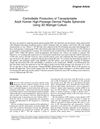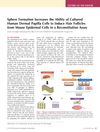TLDR Some types of extracellular matrix can change how human skin cells grow but don't affect their basic functions.
The study from 2016 examined how different extracellular matrix (ECM) types—type IV collagen, fibronectin, Matrigel, and hyaluronate—affect the growth characteristics of human dermal papilla cells (DPCs) in vitro. It was found that type IV collagen and fibronectin improved the migration, aggregation, and viability of DPCs, while Matrigel and hyaluronate did not. Although Matrigel increased mRNA expression of certain genes, such as NCAM and α-SMA, and hyaluronate decreased their expression, these changes were not reflected at the protein level. The study concluded that while ECM types can alter some growth characteristics of DPCs, they do not impact the cells' biological functions. The research was funded by the Natural Science Foundation of China and the Specialized Research Fund for the Doctoral Program of Higher Education, China.
 46 citations
,
September 2014 in “Tissue engineering. Part A”
46 citations
,
September 2014 in “Tissue engineering. Part A” Researchers created hair-inducing human cell clusters using a 3D culture method.
 57 citations
,
February 2013 in “Journal of Dermatological Science”
57 citations
,
February 2013 in “Journal of Dermatological Science” Improving the environment and cell interactions is key for creating human hair in the lab.
 78 citations
,
October 2012 in “Biomaterials”
78 citations
,
October 2012 in “Biomaterials” Larger spheroids improve hair growth, but size doesn't guarantee thicker hair.
 75 citations
,
August 2011 in “Journal of Investigative Dermatology”
75 citations
,
August 2011 in “Journal of Investigative Dermatology” Forming spheres boosts the ability of certain human cells to create hair follicles when mixed with mouse skin cells.
 25 citations
,
August 2010 in “Acta Biomaterialia”
25 citations
,
August 2010 in “Acta Biomaterialia” Researchers developed a method to grow hair follicle cells for transplantation using a special chip.
 321 citations
,
December 2009 in “Journal of Dermatological Science”
321 citations
,
December 2009 in “Journal of Dermatological Science” Dermal cells are key in controlling hair growth and could potentially be used in hair loss treatments, but more research is needed to improve hair regeneration methods.
 1113 citations
,
August 1999 in “The New England Journal of Medicine”
1113 citations
,
August 1999 in “The New England Journal of Medicine” Hair follicle biology advancements may lead to better hair growth disorder treatments.
 2 citations
,
July 2016 in “Clinical and Experimental Dermatology”
2 citations
,
July 2016 in “Clinical and Experimental Dermatology” Some types of extracellular matrix can change how human skin cells grow but don't affect their basic functions.








